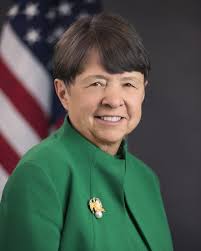(Bloomberg) — U.S. Securities and Exchange Commission Chair Mary Jo White waded into a battle over how strongly Wall Street should be punished, saying the commission should stay away from politics and judge cases on the merits.
At issue are additional punishments that automatically kick in when a bank settles an enforcement matter. TheSEChas the power to waive those sanctions, which include barring firms from certain lines of business, and the commission has become divided in recent months over how aggressively to exercise that authority.

In her speech Thursday in Washington, White said that the agency shouldnt use waivers as an additional enforcement tool, echoing the views of Republican commissioners.
Denying a company a waiver under circumstances where the applicable legal standards to grant it are satisfied would be a miscarriage of our duty, White said. Such a decision may not only be disproportionately severe in its impact on a firm that is unable to continue conducting a particular business or capital raising activity, but it could also have negative and unfair repercussions on shareholders, employees and clients.
Blind Eye
The penalty waivers were once a routine and obscure job handled bySECstaff lawyers. The extra punishments are tucked into securities laws and were originally crafted to stop egregious frauds, mainly by small-time schemers and boiler-room operators. Because they kick in automatically when a case is resolved, a company needs to get the agency to waive the penalty.
TheSECwas divided over waivers granted in recent months to Oppenheimer Holdings Inc., Bank of America Corp., and Royal Bank of Scotland Group Plc. Commissioner Kara Stein, a Democrat, said in a public dissent that the waiver theSECgranted to RBS showed that some firms are too big to bar. Stein and Commissioner Luis Aguilar, another Democrat, said the waiver for Oppenheimer showed theSECturned a blind eye to the investment banks pattern of past misconduct.
Financial firms typically seek waivers from three key disqualifications that are triggered when they settle cases. The harshest is a ban on managing mutual funds. Another prevents banks from raising money for private companies. The third, and least severe, takes away a privilege that allows a firm to issue its own shares or bonds withoutSECapproval.
When considering whether to grant a waiver, White said theSECreviews the duration of the wrongdoing, the seniority of the people involved, and whether the misconduct relates to the business for which the bank is seeking relief. Typically, theSECwill grant a waiver if the misconduct was contained in single unit of the bank and didnt spill into areas that are covered by the waiver request.
Kneejerk Exercise
The furor over waivers spread to the Labor Department, which held a public hearing over a waiver sought by Credit Suisse Group AG. The Swiss bank needed a waiver to continue managing pension-fund assets after pleading guilty to helping Americans evade taxes. Labor gave the bank a one-year extension on a temporary waiver.
Congressional Democrats including Senator Sherrod Brown of Ohio and Representative Maxine Waters of California have questioned the SECs discretion to award waivers. Waters said last month she would author legislation that would curb the SECs ability to issue the reprieves.
TheSECalso has imposed conditions on waivers that added safeguards for investors, White said. In the Bank of America case, for instance, theSECrequired the bank to hire an independent consultant to monitor its policies, procedures and compliance. The bank must reapply for full relief, a request that needs to be signed by the banks chief legal officer or chief executive.
Our process is, in short, a thorough, rigorous, and principled application of the law to the particular facts of each case and a process that we continue to scrutinize and enhance, White said. It is not at all a routine or kneejerk exercise.



